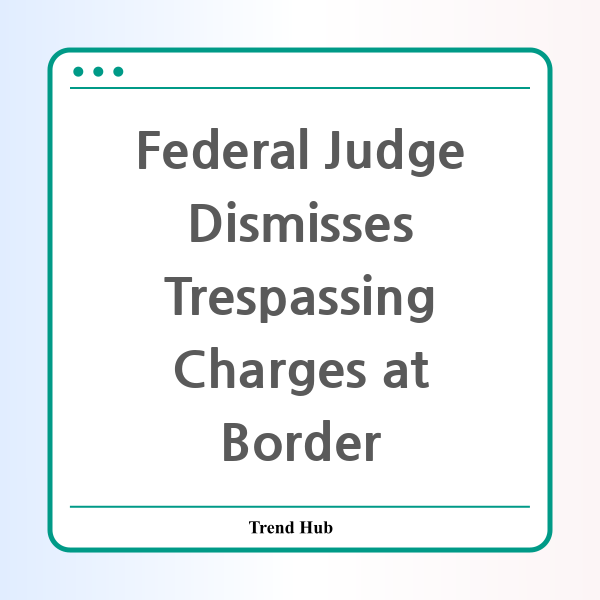* This website participates in the Amazon Affiliate Program and earns from qualifying purchases.

How Will Federal Rulings Impact Migrants at Military Buffer Zones?
In a landmark ruling, U.S. Magistrate Judge Gregory B. Wormuth has dismissed trespassing charges against 98 migrants arrested for entering a new military buffer zone along the Southwest border. This decision has significant implications not only for the individuals involved but also for the ongoing discourse on immigration policies and border security.
The buffer zone, stretching approximately 60 feet into U.S. territory, has been established mainly along the southern border of New Mexico and Arizona. Under the directives of the previous administration, this area is treated as part of a military installation, namely the Fort Huachuca Army base in Arizona. Judge Wormuth's ruling indicated that the federal government failed to provide sufficient evidence that the defendants knowingly breached the newly created military zone.
The key factors in this case revolve around the concept of "mens rea," or the intention or knowledge of wrongdoing that constitutes part of a crime. In his ruling, Judge Wormuth highlighted that without clear evidence showing that the migrants were aware they were entering a military zone, it would be unreasonable to charge them with willful trespass. He noted that the terrain is rugged and challenging, which may have obscured the military signs indicating restricted access.
The dismissal has drawn attention to the broader implications of prosecuting individuals under these circumstances. Many of the migrants are from non-English speaking countries, leading defense attorneys to question whether the posted warnings were even understood. Critics argue that the legal framework surrounding these charges may not truly consider the realities faced by migrants who often traverse treacherous terrain.
As reported, the judge’s ruling has repercussions beyond just this immediate case. It raises important questions about the government's approach to border security. With military personnel patrolling these zones and empowered to detain suspected trespassers, the legal boundaries of enforcement are being tested.
While the dismissal pertains specifically to the trespassing charges, it’s crucial to note that the migrants still face charges for entering the U.S. illegally. The legal battles for these individuals are far from over; prosecutors have the option to refile the dismissed charges, indicating that the current legal landscape remains uncertain.
Additionally, Judge Wormuth's ruling serves as a reminder of the complex intersection of military law, immigration policy, and individual rights. The Pentagon has cited national security concerns as the basis for establishing these buffer zones, yet legal experts argue that the enforcement of such broad military regulations on individuals who may not even be aware of their surroundings raises ethical and legal dilemmas.
As this situation develops, it will be vital to observe how the federal government reconciles its enforcement strategies with the legal expectations set forth by the courts. The ongoing challenges that migrants face at the border extend far beyond just their physical journey; they also navigate a convoluted legal framework that can have life-altering consequences.
Ultimately, this case underscores the delicate balance between national security and the treatment of vulnerable populations. As further legal proceedings unfold, stakeholders from all sides must grapple with the broader implications not only for immigration policy but for the very fabric of justice in America.
* This website participates in the Amazon Affiliate Program and earns from qualifying purchases.